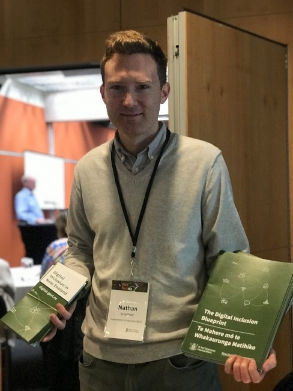Department of Internal Affairs’ Service Innovation Team members share ‘nuggets’ from sessions they attended at last week’s NetHui.
Department of Internal Affairs’ Service Innovation Team members share ‘nuggets’ from sessions they attended at last week’s NetHui.
What is NetHui?
NetHui is a 2-day annual event organised by InternetNZ and this year was held in Wellington. It is Aotearoa’s largest ‘internet gathering’ which draws together a wide cross-section of people to think about the future of the internet.
Many of our team were particularly interested in sessions on digital inclusion, which is one of our focus areas on behalf of the Government. I was tasked to pull their feedback together.
Insights from the sessions
The Digital Inclusion Research Agenda — speaker Nathan Scofield DIA Principal Advisor
Nathan spoke on the Digital Inclusion Research Agenda. This work comprises the Government’s recommended priorities for digital inclusion research for 2019 to 2022.
The Digital Inclusion Blueprint and Digital Inclusion Action Plan, Te Mahere mō te Whakaurunga Matihiko, were released in May 2019 and a series of related research reports have been released since, including the following:
- Stocktake of government and community initiatives
- Digital Inclusion Outcomes Framework
- Evaluation of digital inclusion initiatives.
Recent research indicates the 2 most digitally excluded groups are those in social housing and those with disabilities.
The Research Agenda was seen as really valuable for deciding where efforts need to be directed; the feeling from people at this session (which occurred on the related Partners Day before the main hui) is they want to see tangible action begin.
On that note there was an announcement that the Government is hosting a free Digital Inclusion Cross-Sector CONNECT Forum in Wellington on 29 October, 2019.

Speaker Nathan Scofield displays copies of the Digital Inclusion Blueprint, which is available in print form in te reo Māori and English
Rural access — Angela Mcleod Rural Women NZ and Craig Young CEO TUANZ
New Zealand’s rural population is 600,000 — that number of people needing good internet access makes this an equality issue.
‘Rural people’ was a description for a diverse group of people, some living more remotely than others.
Examples of issues facing rural people that workshop attendees provided were:
- 600 of the 2000 members of Rural Women NZ do not have email — this is either because they have no access, no skills or no reliable internet connection.
- Some rural people going back to their old CB (citizens band) radios — this is a health and safety issue because cell phone connection was not reliable in the case of an emergency.
- GPS is used to help farmers guide straight lines when ploughing.
- A marae wanting access to be able to monitor lake water quality.
Reliable internet (access) is the main issue along with affordability - pricing of services to rural areas is often higher. Many rural dwellers near cities or towns who travelled in to work would like better access so they could work from home part of the week, which would reduce car use.
People need to be empowered to find their own solutions — it’s about tino rangatiratanga.
We want to sort this for ourselves — we’re not asking government to ‘do it’.
Some in the audience shared examples of how they had succeeded in finding their own solutions – using willing locals with the right skills who were motivated to act as ‘ambassadors”. Greater connectivity means greater productivity, and this was especially important for Māori.
Digital Inclusion for retirees and seniors — Francesca Holibar and Rachel McAlpine
By 2034, more than 1.2 million New Zealanders will be aged 65+. People will live far longer. Many seniors lack the necessary motivation, access, knowledge and skills to benefit from the internet.
Francesca said previous national strategies for healthy or positive ageing had downplayed the role of the internet. However, government now has a mandate to provide seniors with equal access to digital services, communication and entertainment.
Seniors are not one group: the research identifies 7— from the highly efficacious to those terrified of technology. Telcos offer some special deals for seniors but these did not appear well-promoted or did not offer a lot of data.
Technology to support accessibility includes:
- big keys
- magnifiers
- voice activation
- sound amplification.
Many groups are working in this area but the ‘build it and they will come’ philosophy is not so effective — older people often do not understand the benefits of digital - more tailored approaches seem to be better.
Seniors need to understand the bounty.
This was especially so with more services going online. One person said the best approach he had used - and it applies to all people - was to teach people how to learn to learn i.e. how to look up YouTube and Google and help sites that can provide answers. That means seniors are not made to feel silly by having to constantly ask for help — they understand the technology better.
Simplifying the interface for those with less digital nous poses a safety risk. Also risky was lack of understanding of the need for security around passwords — which applies to everyone.
Why are we still talking about digital inclusion? — Laurence Millar and Sue West and Digital Inclusion Research Discussion — Laurence Zwimpfer
These sessions looked at who was doing what and what was working. There was a real sense that everyone can play a part in closing the digital gap.
The enthusiasm of others can vary on the location, such as local councils. Whanganui was a standout with its digital strategy for its citizens. How and where do we share all the research so it is widely available?
Examples of how everyone can contribute are:
- volunteering skills to a community group or even a neighbour or family member
- donating devices to groups running tech sessions
- using people power to push service providers for cheap or free deals for those most needing financial support to have access — existing services already offer support in the form of libraries.
More general points captured
The event opened with InternetNZ Chief Executive Jordan Carter stating:
…the internet we need is not the internet we have.
The Christchurch terror attack in March 2019 was an attack for the social media era (and was referenced in many NetHui sessions this year).
Many people around the world, including in New Zealand, are working on internet policy. They have been part of a technology community that argues that solving the problems of the Internet era can be done outside the Internet itself. The problems are with how the internet is used by some people and groups.
InternetNZ is a passionate defender of the open internet, the
- basic technologies that underpin it
- architecture that supports free flowing communication across it
- governance that means that the experts and users, together, are in charge.
The solution requires everyone, not just those working in technology, to be thinking more about the internet, or rather the ‘civil society’ we want.
Prime Minister Jacinda Ardern also attended and spoke about the work of the Christchurch Call she led as a response to the terror attack.


